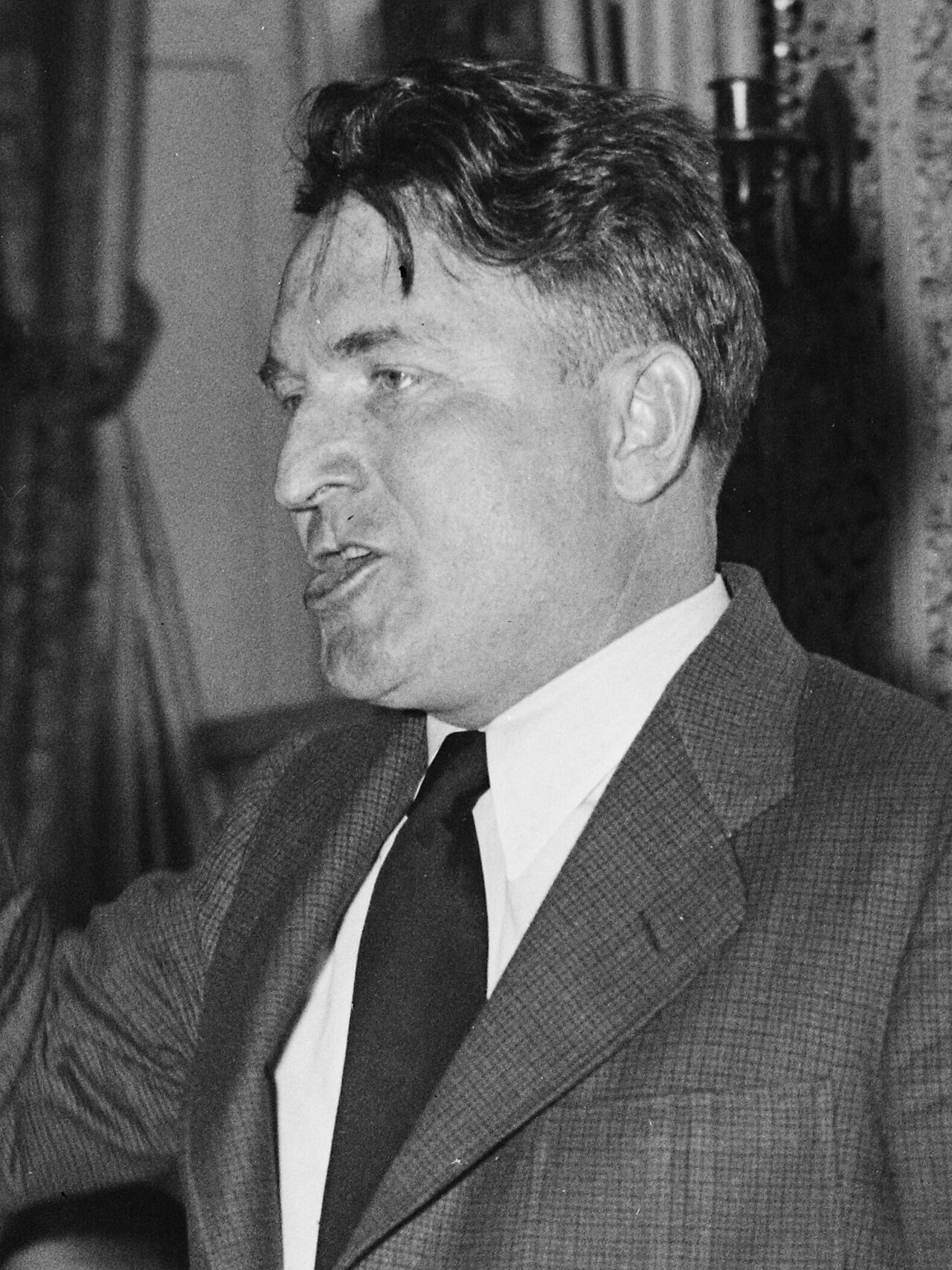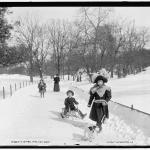As the slow pace of economic recovery left many people discontent, it looked like the Democratic president would face a demagogic, authoritarian-minded populist challenger in his bid for reelection. Millions of people were angry with democratic liberalism and were looking for more radical solutions.
There was also international unrest. A European dictator had just invaded another country for no apparent reason – but few Americans had any desire to help. The United States didn’t need to get involved in other countries’ affairs, most people thought; it had enough to worry about at home.
In the evangelical Protestant world, some premillennial dispensationalist magazine editors speculated that the Antichrist might have already arrived, and they began looking at Israel in anticipation of end-times prophecies. But rather than calling for curbs on international lawlessness, they focused their rhetorical fire on the policies of the Democratic president, accusing him of being a dangerous socialist whose policies threatened American freedom.
Meanwhile, other fundamentalist preachers, along with one nationally prominent Catholic broadcaster, were taking to the airwaves both to denounce the president and to warn about a dangerous political and financial Jewish conspiracy that threatened to destroy the United States from within. Virulent expressions of anti-Semitism were on the rise.
Some of these preachers had weekly audiences in the millions. One received more mail than the president of the United States. The president worried that all of this populist demagoguery might be just enough to affect the upcoming presidential election.
One of the nation’s most prominent novelists was so worried about the prospect that the United States might descend into fascism that he wrote a book titled It Can’t Happen Here. Its subtitle, “What Will Happen When America Has a Dictator,” suggested that authoritarianism could happen here in the United States and that democracy was in jeopardy.
Although most of these things may sound eerily similar to some of the events of our own time, the year I’ve described was not 2024 but rather 1935. The “demagogic populist challenger” was not Donald Trump but rather Huey Long, the former governor of Louisiana who then became a US senator. Long had little regard for traditional democratic institutions; when people in his administration challenged him, he illegally fired them, as he did to his state’s properly elected lieutenant governor. In 1935, Long was gearing up for a populist third-party challenge to President Franklin Roosevelt, and polls showed that he would likely receive several million votes – enough to put Roosevelt’s reelection chances in doubt.

Long’s campaign received support from Father Charles Coughlin, the wildly popular anti-Semitic Catholic radio broadcaster who had an audience of millions for his show that blasted Roosevelt’s New Deal as the “Jew Deal.” It also received support from even more virulently anti-Semitic radio preachers in the Midwest, such as Gerald L. K. Smith and Gerald B. Winrod.
At the same time, international unrest cast a cloud over American politics. The European dictator who ordered an invasion of another country that year was not Vladimir Putin, but rather Benito Mussolini, whose Italian troops invaded Ethiopia without provocation in 1935. But despite an abundance of evidence that the international order was breaking down – evidence that included Nazi Germany’s remilitarization and Japan’s annexation of Manchuria – an overwhelming majority of Americans wanted the US to stay neutral and keep out of foreign wars.
Yet despite all of this – and despite the apprehensions of Sinclair Lewis, the author of the dystopian novel It Can’t Happen Here – a fascist-style dictatorship did not emerge in the United States in the 1930s. Long was assassinated in September 1935, which took him out of the running for the presidential contest of 1936. In his absence, his supporters could not find another person with his charisma and national following to run a populist campaign against President Roosevelt.
The Christian radio broadcasters’ political empires also collapsed. Coughlin, the most popular of the broadcasters, was eventually ordered off the air by his Catholic superiors; when he faced a choice between his clerical collar and holding onto his radio show, he preferred to remain a priest.
The Protestant anti-Semitic radio broadcasters did not face these ecclesiastical constraints, but they, too, lost influence in the late 1930s. Winrod lost the Republican senatorial primary in Kansas in 1938 and was charged with sedition by the US government in the early 1940s because of his opposition to US involvement in World War II. Smith also lost his campaigns for political office and suffered a decline in influence in the 1940s, as he gravitated even further toward the anti-Semitic far right. His America First Party, which he organized in 1943, foundered. The fundamentalist magazines that warned that Roosevelt might be a dictator and a precursor for the antichrist muted their criticisms after World War II began and the Depression ended. But even before then, Roosevelt’s landslide reelection victory in November 1936 demonstrated that his support was more solid than perhaps he had feared. And while Roosevelt’s liberal view of executive power alarmed some conservatives, he was a far cry from the fascist-style dictatorial populist figures that seemed a political threat in the 1930s. Under FDR’s leadership, the basic framework of American democracy was preserved.

But why didn’t a populist authoritarian figure take over the United States and subvert the democratic system in the 1930s? After all, the country was in the midst of the Great Depression, with an unemployment rate as high as 25 percent at times. There was widespread discontent with the political status quo, both before Roosevelt’s election in 1932 and even for several years after it. There were marches on Washington – including, most famously, a Bonus Army march of thousands of World War I veterans who descended on the capital in the spring of 1932 to demand payments from the government for their war service and who then set up camp and refused to leave until the US army dispersed them by force.
Nearly every sign of popular political discontent that we can detect today was present in greater measure in the 1930s – which is why a lot of Americans across the political spectrum were willing to give up on democracy and support an authoritarian leader, at least for the moment. Even Republican politicians – the last ones one might have suspected of wanting to give Democratic president Franklin Roosevelt dictatorial powers – were willing to entertain the notion (even if only very briefly) because of the nation’s dire economic straits. “I think we need a ‘dictator,’” Republican senator Arthur Vandenberg of Michigan said in 1933. “But a dictator is of no use unless he dictates.” Kansas Republican governor (and future presidential candidate) Alfred Landon agreed. “Even the iron hand of a national dictator is in preference to a paralytic stroke,” he said.
So, why didn’t Sinclair Lewis’s ominous predictions become a reality? Why didn’t the United States take a plunge into authoritarianism during the Great Depression?
And, if we can pinpoint the reason why the US managed to escape a brush with dictatorship at this perilous moment in the 1930s, can we apply these insights to our own time, when many people are worried about the potential subversion of our democracy?
The answer may not be one that will offer us much comfort today, because it doesn’t suggest that the United States was saved from authoritarianism by its people’s love for democratic institutions. But there was one important check on the people’s potential gravitation toward a potential dictator: the party leaders who controlled the presidential nomination process.
At the time, most states did not hold presidential primaries, and even the ones that did often threw their votes to a local “favorite son” (such as the state’s own governor or senator) who could never attract enough votes across the nation to win the nomination. As a result, the real nomination contest took place at party conventions, where delegates pledged to a particular candidate who could never win a majority might negotiate with representatives of opposing campaigns to see which of the more promising candidates might best represent their interests. This type of nomination process tended to favor experienced, consensus-minded candidates, since no one could win the nomination without appealing to a broad cross-section of the party across multiple regions.
Today a populist figure like Long would probably not hesitate to mount a primary challenge against an incumbent, but that was inconceivable in the 1930s, since the party conventions would be highly unlikely to give the presidential nomination to such a maverick. So, instead, Long was expected to run a third-party campaign and act as a spoiler in the race – or, as Roosevelt feared, throw the country into chaos to the point where people were ready to proclaim him dictator. The idea may have been far-fetched, but the thought that the leaders of the Democratic Party (or the Republican Party, for that matter) would ever consider giving the party nomination to a populist demagogue was even more unbelievable. If Long had any hope at all of running a viable presidential campaign, that hope would come through a third-party run, not through the conventions of either of the two major parties.
All of that changed in the 1970s, when party primaries across the nation began to replace the convention negotiations as the path to the White House. The move seemed much more democratic – and it probably was. Progressives had advocated the direct primary for decades.
But voters in party primaries often held more extreme views than convention delegates had – if not a different set of concerns altogether. When party conventions controlled the nomination process, they could easily ignore the views of religious demagogues on the radio or fundamentalist diatribes in religious periodicals. But as soon as the presidential primaries replaced the convention nomination process, primary voters began demanding that presidential contenders answer their questions about culture-war issues such as abortion and even evolution.
Grassroots movements pushed a political agenda that conventional party leaders didn’t want – but ultimately had to accept. At a time when mainstream Republican leaders favored immigration reform legislation that would offer amnesty for undocumented immigrants already in the United States, Republican voters at the grassroots protested and launched the Tea Party to change the GOP’s direction. The movement eventually found a champion for its cause in Donald Trump.
If traditional party leaders had controlled the nomination process in tightly run party conventions (as they did in the 1930s), the 2016 presidential election would have been a very different contest – and so, by extension, would 2020 and 2024. In November 2016, voters in the presidential election would have faced the choice between an immigration moderate like Jeb Bush (or maybe, if more strident conservatives had had their way at the Republican convention, Marco Rubio) and a centrist establishment Democrat like Hillary Clinton (who would not have had to worry about a serious primary challenge from a democratic socialist like Bernie Sanders).
Either Trump or another anti-establishment, immigration hardliner from the Tea Party might have mounted a third-party challenge to the establishment candidates, but at most, that candidate could have acted as a spoiler in the race; no third-party candidate could have actually won the presidency. And since it is certain that the 2016 Republican Party establishment would never have nominated Donald Trump, it’s equally certain that Trump could never have become president under the old convention system – and the party realignment that happened as a result of Trump’s election would not have been able to occur. Nor would the United States currently be facing the possibility of an authoritarian turn if the likely Republican presidential nominee wins the general election.
This may sound like an anti-democratic conclusion, since it seems like I’m saying that the only way to save American democracy and avoid a slide into authoritarianism is to limit popular democracy in the nominating process. That doesn’t sound like a very hopeful conclusion – though actually, it accords pretty well with the warnings of Alexander Hamilton and a few other founders about the dangers of a populist candidate if too much democratic power were given to the people without the appropriate checks and balances that the founders included in the original constitutional system.
But actually, I think that we can draw another conclusion from all of this – and that is this: Because we now live in a system of direct voter presidential primaries, where voters such as ourselves have a greater influence on the presidential nomination process than ever before, we have a greater responsibility to preserve our democracy than previous generations of Americans did. This warning is especially applicable to conservative Christians, who often have not made the preservation of the democratic process a high political priority.
In the 1930s, religious broadcasters such as Coughlin, Smith, and Winrod could spew anti-Semitic invective and support an authoritarian populist like Huey Long without affecting the presidential nominations of either of the nation’s major political parties. What they did was damaging enough, but it wasn’t sufficient to put an authoritarian leader in the White House. Nor was all of the end-times speculation in fundamentalist premillennial dispensationalist magazines likely to have much practical effect on a presidential election. But once the direct presidential primaries became the method the nation used to nominate its presidents, that changed. The words of a nationally influential religious broadcaster suddenly mattered a lot more. Indeed, a nationally influential religious broadcaster could now even run a credible campaign for president himself, as Pat Robertson did in 1988.
In such an environment, where voters now have the power to choose not only a president but also a party’s presidential nominee, it’s more important than ever for us to think about how our votes will affect the future of our democratic process – not merely the future of the particular agenda we care about.
Democracies, it turns out, are extremely fragile. Most of the world’s democratic experiments over the last 200 years have collapsed into some form of authoritarianism. But a few have lasted longer – and among those has been the United States.
In 2016, Harvard history professor James Kloppenberg published a massive global comparative study of democracies in which he concluded that the key to a democracy’s success is the willingness of voters to look beyond their own narrow self-interest. In the United States, he said, voters have done that primarily because of the influence of liberal Protestantism, which encouraged even affluent, privileged people to care about the rights of the marginalized and less fortunate. But now that liberal Protestantism and the values associated with it are in decline, the future of American democracy seems more perilous.
In the 1930s, plenty of people outside the liberal Protestant establishment did not share these values, and some of those people seemed like they could be open to exchanging American democratic pluralism for some of sort of fascist-like authoritarianism or anti-Semitic conspiracy theories. But in the end, the presidential nomination process was controlled by people who tended to gravitate toward practitioners of the liberal Protestant social ethic – that is, toward people like the Episcopalian liberal Democrat Franklin D. Roosevelt, whose New Deal was a call to extend the nation’s economic safety net to the poor and the marginalized.
But today we don’t have a majority liberal Protestant culture to protect us, and we don’t have a presidential nomination process controlled by party leaders with the power to give the nomination to someone who longs to inspire people to look beyond their own self-interest. Instead, we just have the voters as the only barricade now holding the nation back from an anti-democratic authoritarian turn.
It’s now up to the voters to show the foresight and selflessness necessary to preserve the nation’s democracy. And if they don’t, we no longer have much reason for confidence that an authoritarian turn “can’t happen here.”













